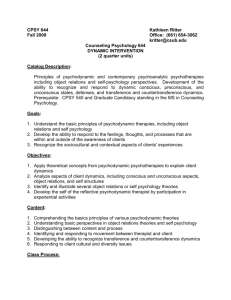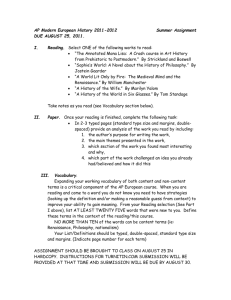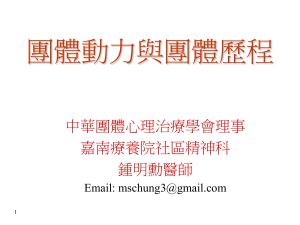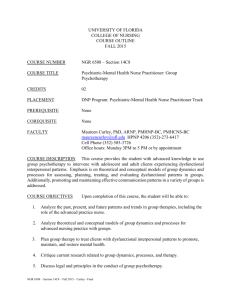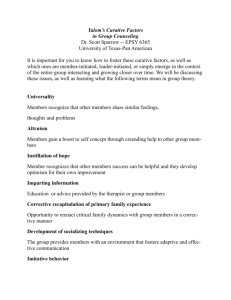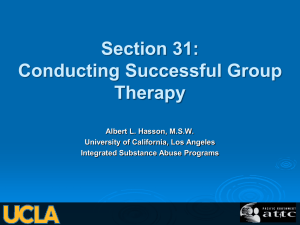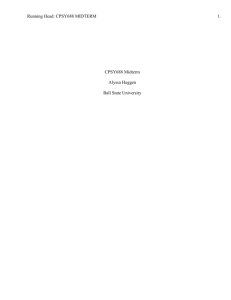Theories – Book Report – loves executioner
advertisement
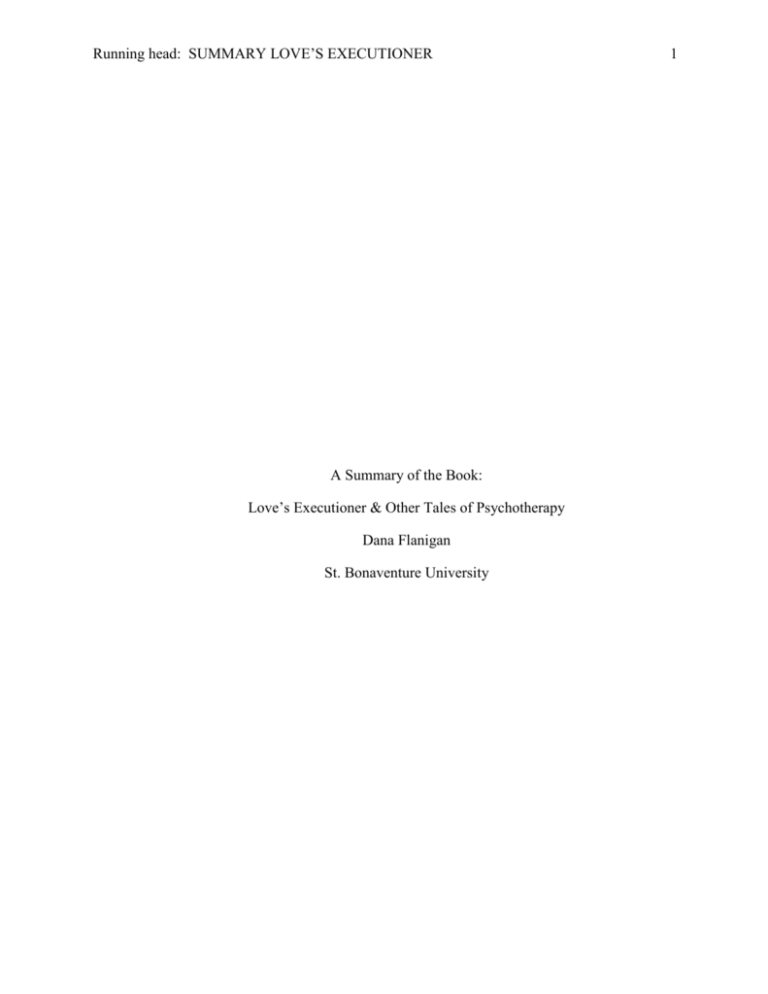
Running head: SUMMARY LOVE’S EXECUTIONER A Summary of the Book: Love’s Executioner & Other Tales of Psychotherapy Dana Flanigan St. Bonaventure University 1 SUMMARY LOVE’S EXECUTIONER 2 Somebody once said that there is nothing better than the real thing. That notion rains true in the book “Love’s Executioner,” by Irvin Yalom. Inside this book, Yalom unveils ten real stories that he has experienced first hand in his work in the field of psychotherapy. Although specifics were altered to protect the identity of the individuals, the real nature of each case gives it the potential to benefit aspiring members of all facets of the helping profession. Especially with the credentials that Yalom possesses; Professor Emeritus of Psychiatry at Stanford University, he lives and practices psychotherapy in California, and he has written numerous textbooks as well as countless other books such as “Love’s Executioner” which will be discussed further. Three questions will be answered in the paragraphs that follow. First, what is the common theme running through each of the stories and what is the central point the author is trying to make regarding the therapeutic enterprise. Second, which theory or theories does the author use in his narration of the cases, providing examples as evidence. Third, I will explain how the book affected me in terms of; my understanding of counseling, what I learned from Yalom’s position on the counseling relationship and sis it change my view, and would I go to Yalom for counseling adding text citations to convey why or why not. Upon concluding the last of the ten stories, the thread that had run through each of the cases was extremely clear. However, putting it into words sometimes does not come natural in these contexts. Luckily, there is statement on page five in the prologue by Yalom that conveys it perfectly, “I have found that four givens are particularly relevant to psychotherapy: the inevitably of death for each of us and for those we love; the freedom to make our lives as we will; our ultimate aloneness; and, finally, the absence of any obvious meaning or sense of life. However grim these givens may seem, they contain the seeds of wisdom and redemption. I hope SUMMARY LOVE’S EXECUTIONER 3 to demonstrate, in these ten tales of psychotherapy, that it is possible to confront the truths of existence and harness their power in the service of personal change and growth.” The four givens were clearly seen throughout the ten stories that are comprised in Yalom’s book. The first story was extremely interesting as it seemed to set the tone for the rest of the book. Yalom made his stance clear on his opinions of love. However, he took on the client anyway. The client was a seventy year old woman that had been in disarray for almost a decade; since she had engaged in an affair with her therapist. As this therapeutic relationship unfolded it, the power of existential counseling shined its light. Yalom seemed consistent in his approach, but there was another side to this scenario. In theory, the woman suffered from this obsession that she was holding on to; that much was obvious. However, if it were something that consumed so much of her life, would it not leave an enormous void? Yalom was skilled at removing the obsession, although the old woman seemed to be left with nothing. This scenario was much different in many of the other cases, especially case two. In case two, “If Rape were Legal,” Yalom was attending to a terminally ill patient who was confronting his mortality through sexual imagery. After alienating himself, proclaiming the positives of rape, Yalom requests ‘Carlos’ in hopes of turning around his twisted views. The interaction between the two men was quite interesting. Yalom was able to see a few holes in the statements Carlos was making, and eventually turn the tables on him. It was truly remarkable to see such an estranged individual, make such a drastic change. Carlos was able to rejoin the group, and make true friendships with men and women in the final months of his life. Yalom was confident that he could help when he brought in Carlos; a confidence that he maintained SUMMARY LOVE’S EXECUTIONER 4 throughout the time he worked with him. This comfort was much different in the third case in Loves Executioner. In the third case, Yalom was extremely uncomfortable when treating an obese woman named Betty. Yalom did good explaining his resistance for treating a client like Betty. Apparently, Yalom grew up hating fat kids, as a way to project his anger on to someone. An anger that he had built out of the resentments created from all of the people that treated him badly because he was white and Jewish. This case was educational for anyone in the helping profession; everyone has a past, even if you are a counselor. Yalom was able to work through his issue and treat the obese woman. Betty was able to get over her depression and lose over a hundred pounds. This case went well with the other nine in displaying the core theoretical approach. It was clear in reading the prologue that Yalom was an existentialist. However, it is the ten cases that make these claims come to life, metaphorically. Yalom displays his existentialist persona in the way he thinks about his clients, in the techniques he uses to assist his clients, and the overall way that he approaches his clients. Each of the four givens mentioned previously are seen at the core of everything Yalom did when working with these ten patients. Although some of these patients shared some similar facets, each brought a unique case to the office of Dr. Yalom. Regardless of how distinctive the case was; Yalom handled each with an extremely consistent philosophy. In each case, Yalom unveiled that their problems were merely common problems of everyday life that were surface issues for underlying existence troubles. Prior to reading this book, I would have never thought of using an existentialist style. At times it is hard to understand some of the approaches by reading about it in a text book. It was SUMMARY LOVE’S EXECUTIONER 5 interesting to compare the style case by case to see how Yalom set his approach into motion. I think the thing that was most appealing from an aspiring counselor’s perspective was the consistency of the approach. Yalom seemed to handle each case the same way, and he was effective in every one of them. Personally, I would definitely go to Yalom to provide me counseling. Many of the things I struggle with day to day would be music to the ears of an existentialist counselor. There were many instances in Yalom’s book that stuck out to me and made me impressed by his style. I was mostly affected by his work with Carlos. In many ways, I felt like I could completely relate to Carlos situation. Let me explain, I am not dying and I do not wish rape was legal; but there are some circumstances to his story that I was directly affected by. There have been many situations that made me feel uneasy in the past. Each time, my first impulse was to isolate and alienate myself. Due to my uncertainties and insecurities, I decided to project my internal struggles on others, before they had a chance to do it to me. I was able to do this by using humor and sarcasm; however Carlos took a little bit different of an approach. Yalom took a bold approach when he brought Carlos’s daughter into the scenario. It was amazing watching the apparent heartless man crumble at the seams. If I ever decide to use an existential approach, I may be timid toward using such a brash approach at first. It was clear that with the way Carlos was presenting himself to people, an approach like the one used by Yalom was really the only one that may have worked. It also affected me when I saw the way in which Carlos responded and the actions that followed. Although he passed on, he was able to accomplish some great things in his own life before that transpired. In many way it may me wonder what I wanted to accomplish before I die. SUMMARY LOVE’S EXECUTIONER 6 In conclusion, this was a right book for the right time. I was trying to find my niche in this profession since starting the program. I was trying to mold my style based off of all the theories. It was not until reading this book, when I could finally just craft an approach to my normal philosophies. For years now, I have had the mentality of an existentialist; although I had no Idea what one was. In this book, Yalom made it look so easy and consistent to apply the existential approach to many different types of cases. Although I am aware that it will not be that simple for me, at least now I have something to build off of. Thank you Allen Weber!
